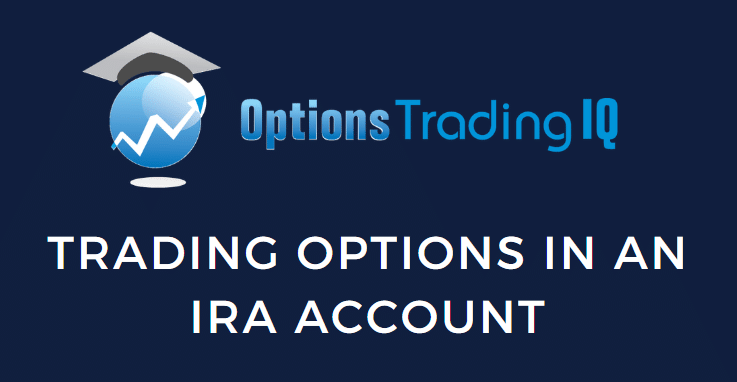

Many new options investors ask if trading options in an IRA account is possible.
The short answer is yes.
However, there are some potential differences or caveats. Read on.
An IRA account is an Individual Retirement Account that offers individuals specific tax advantages to encourage them to save and invest for retirement.
There are different types of IRA accounts, including traditional IRAs, Roth IRAs, SEP IRAs, and so on.
In this article, we’re talking about IRA accounts in general.
Contents
Not Seeing Any Options In My IRA.
To trade options in an IRA account, the account holder has to go through an application process by the broker.
This application process will determine what option levels are allowed to be traded if any at all.
Different brokers will have different option levels corresponding to the risk level allowed for certain option strategies.
Certain selling options strategies will require the account to be a margin account.
Most likely, the account will start as a Regulatory-T margin account.
In the United States, SPAN and portfolio margin are additional margin accounts that give the trader greater leverage.
Rightfully so, the broker will require an additional application process to grant those.
There are typically three or more option-level tiers with more rigorous approval requirements at subsequent tiers, given the additional risks associated with more complex strategies.
The lowest tier and the easiest one to be granted is where the investor is allowed to buy long calls and put options.
In the next higher tier (or it could be the same tier depending on the broker), the investor can sell puts, but only as “cash-secured puts,” whereby they are required to have sufficient cash set aside in the account to purchase the stock as obligated in the event of assignment.
They can sell calls only as “covered calls,” where the short call is covered by long stock.
The Highest Tier
The next higher tier allows the investor to do spreads, including vertical and horizontal spreads (such as calendars).
This level is needed to trade credit spreads, iron condors, butterflies, calendars, and other complex option structures.
The highest tier allows for the selling of uncovered calls and puts. Depending on your broker and/or your country’s regulation, this tier may not be available in IRA accounts due to the increased risk.
These requirements, or restrictions, are intended to help protect inexperienced option investors from losing their retirement accounts.
The key word here is “help protect,” not guarantee protection.
Even at the lowest option tier, it is possible to lose the entire account.
The disclosures that one must sign will likely mention something about that possibility.
Frequently Asked Questions
What is margin?
Margin is the amount of money or collateral that investors must deposit with their broker to trade options.
Margin ensures that investors have the financial capability to cover potential losses. Each option trade has a specific margin requirement.
This margin uses up buying power in the account.
How is the margin calculated?
The amount of margin used per option trade will depend on the broker and the country the account holder is in.
Even within the United States, one broker may margin a calendar option trade differently than another.
We know from option theory that the maximum loss of a calendar spread is the debit paid for the calendar. And many brokers set the margin for this trade as that debit paid.
In this sense, the margin is like the maximum risk of a trade.
However, some brokers will margin a calendar based only on the short option.
So, to trade a calendar, you need enough cash in your account to cover the short option should it be exercised or assigned.
Depending on how the broker calculates the complex option structures, they can also have different margin requirements.
In Canada, for example, the margin on a broken-wing butterfly may differ from that in the United States.
Why do I need to have a margin account to trade options?
Margin grants the account holder the ability to “borrow.”
To sell an option, the investor sells something they do not currently own.
They are “borrowing” it to be able to sell it.
To close the trade, they will buy the option back.
Throughout the entire duration of the trade, they had never owned that option contract.
How involved is the application process to trade options?
Depending on your broker and country, it can be as simple as filling out a questionnaire online or a more involved process.
The application process may ask for your income and asset status and level of experience trading options or other questions.
There will be an explanation of the risks and disclosures that you must read and sign.
How long does it take to get approved?
I really can not say since that depends on your particular broker’s processes.
How can one gain option trading experience to gain access to trading options?
Some of the applications to trade options may ask how many years of experience the investor has in trading options.
If they have never traded options before, how can they get experience in trading options?
That is a “catch-22” question that I can not answer.
I can only say that some brokers and account types may have a stricter or less strict application process.
I am not a financial advisor, and this is not financial advice.
This is only general information that may or may not apply to your situation, which I have no knowledge of.
We hope you enjoyed this article on trading options in an IRA account.
If you have any questions, please send an email or leave a comment below.
Trade safe!
Disclaimer: The information above is for educational purposes only and should not be treated as investment advice. The strategy presented would not be suitable for investors who are not familiar with exchange traded options. Any readers interested in this strategy should do their own research and seek advice from a licensed financial adviser.










